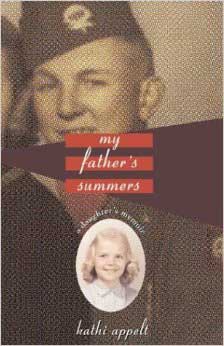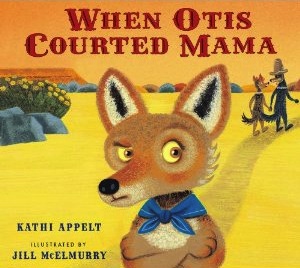TeachingBooks.net is delighted to welcome award-winning author Kathi Appelt as our featured guest blogger.
Each month, we ask one distinguished author or illustrator to write an original post that reveals insights about their process and craft. Enjoy!

Mostly Wonderful: The Story Behind
When Otis Courted Mama
by Kathi Appelt

Not long after my dad died, just after Christmas in 1999, I found myself in the throes of intense grief. I had experienced loss before. Grandparents had passed away. Friends had left me, too. But I had never felt the kind of profound sadness that engulfed me when my father died. It caused my knees to buckle and for months I felt like I was slogging through quicksand, each step muddier than the one before it.
It wasn’t that my father was a perfect dad. He wasn’t. Regardless of all of his imperfections, he always loved me. When you lose a parent, you lose someone who loves you no matter what you have done or who you are or how mucked-up your relationship might have been. Most parents love their kids unconditionally, and it’s the loss of that unconditional love that is most deeply felt. This is my theory at least, and I’m sticking to it.

For me, the best way to deal with any issue is to write about it. So I turned to the page, and as I wrote, the memories flooded back. Writing about my father helped me make some sense of our history as daughter and dad. It wasn’t easy; when I was only nine he left my mother and me and my sisters and started a new life, a life that included steps. Stepmother, stepbrothers. Step grandparents. Step aunts and uncles. Step cousins. Lots of steps.
There was lots of craziness, too, including the night my stepmother shot my dad in the backyard of their home in northwest Houston. He lived through it. It was a scene I hadn’t thought of in years, and if my father were still alive, I might not have thought about it again, ever. Nevertheless, all those memories eventually became a memoir, written in small snapshots and called My Father’s Summers (Holt, 2004). The scenes aren’t written in chronological order; they’re set down in the way that memories are recalled, somewhat randomly.
In the process of writing that book, other players naturally showed up. One person who arrived, almost unannounced, was my stepfather George. He was a sweet man, a lifelong bachelor, who married my mother when I was sixteen and my sisters were fifteen and fourteen. Wasn’t he brave to marry a single mom and her three teenaged daughters? I think so.

What I remember most about George was what a good storyteller he was. He loved to tell us about his childhood in tiny Cameron, Texas. And for each and every dog he had ever owned, he had a dozen wild yarns. Our favorites were the stories he told about Clyde, possibly the ugliest dog to ever set paws on the planet.
When I finished my memoir, it seemed that I had more to say about George. Moreover, I realized that in children’s books, stepparents often get the short shrift. Fairy tales and folktales are rife with evil stepmothers and wicked stepfathers. My own stepmother had a whole litany of issues. (She did shoot my father, after all.) But even she had her kindnesses that sometimes emerged beneath the blanket of what I now understand was serious mental illness.
Like my father, George wasn’t perfect, but he did his best and his stories served as embraces. They lightened the mood when the mood was dark. They lessened the tension when the tension was high. They wrapped us all in what can only be called a family circle, even though that circle wasn’t necessarily round.
 George didn’t replace my father. He took some getting used to, but he filled a space in my life. Thus, When Otis Courted Mama (HMH, 2015)—my story about Cardell, a little coyote who suddenly has a George in his life—is my attempt to offer up a stepparent in children’s books who will never shove the kids in the oven or banish them to the wolfy woods. Otis cares deeply about his place in Cardell’s life. In fact, it’s what I suspect most stepparents do: care deeply for their charges, no matter the circumstances.
George didn’t replace my father. He took some getting used to, but he filled a space in my life. Thus, When Otis Courted Mama (HMH, 2015)—my story about Cardell, a little coyote who suddenly has a George in his life—is my attempt to offer up a stepparent in children’s books who will never shove the kids in the oven or banish them to the wolfy woods. Otis cares deeply about his place in Cardell’s life. In fact, it’s what I suspect most stepparents do: care deeply for their charges, no matter the circumstances.
Why coyotes? Unlike bunnies and lambs and even bears, coyotes are scruffy and tough and they manage to survive in pretty much every habitat. Families aren’t necessarily cute and fluffy—sweet wasn’t what I was going for. Coyotes, with their wiles and their tendency to make the best of hard situations, seemed perfect. And heck, if they can’t solve a problem, then a good howl can save the day. Jill McElmurry, with her innate knowledge of the southwestern setting, brought it all together with her whimsical art.
I was lucky to have a terrific stepfather, just as millions of other kids have great stepparents. There are a lot of Otises out there, thank goodness. May they have a million funny stories to share, so that life—sand fleas and sticker burrs aside—can be mostly wonderful.

Leave a Reply